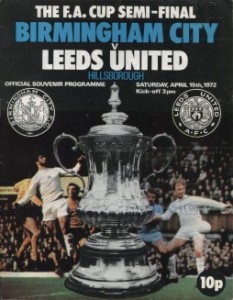2011/12: FA Cup Semi-Finals
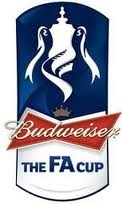
Friday 13 April 2012
When the FA Cup reached the Semi-Final stage it used to be said that the teams were just 90 minutes away from Wembley. However, that all changed in the first weekend of April 2008 when the games were no longer played at neutral venues. The FA in their wisdom, ensured another tradition was removed from the World’s Oldest Cup competition, and found another method of taking yet more money from fans. It doesn’t enhance the Cup and in fact creates a massive dilemma for supporters. A friend of mine (a Stoke City fan), last season had to decide whether to go to the Semi-Final or take a chance and see if they got to the Final, as they were simply not able to afford attending both games. Is this what The FA see as improving the fan experience? My hope is that in the near future, Semi-Finals will return to neutral venues. With stadium improvements in this country, we have enough suitable grounds that can host large crowds. However, the sound of ker-ching as coffers grow at The FA is probably set to continue to drown out the voice of tradition.
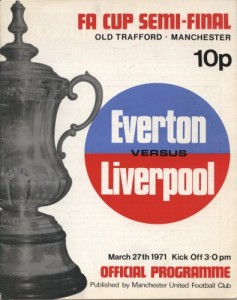 So this weekend the pockets of fans particularly from Liverpool and Everton, and also Chelsea and Spurs, are severely stretched as Merseyside and London derbies take place at Wembley. Everton and Liverpool have meet on four occasions in the FA Cup Semi-Finals. The first meeting was in 1906 at Villa Park, when Everton beat Liverpool 2-0. The Toffees then went on to overcome Newcastle United in the Final. The Reds had to wait until 1950 before the next Semi-Final meeting with Everton. At Maine Road, Liverpool triumphed 2-0, but were unable to overcome Arsenal in the Final. Old Trafford was the venue for the next meeting of the Merseyside giants in 1971. Everton lead at half-time 1-0 thanks to a goal from Alan Ball, however back came Liverpool and goals from Alun Evans and Brian Hall sent the Reds through. However as in 1950, Arsenal were waiting in the Final and as then, The Gunners took the Cup in 1971. The last Semi-Final meeting took place in 1977. It turned out to be a bit of a classic in which Liverpool went ahead twice through goals from Terry McDermott and Jimmy Case, with Everton equalising through Duncan McKenzie and Bruce Rioch. With the game at 2-2 and less than five minutes to go, Everton thought they had won the game when Bryan Hamilton scored, however referee Clive Thomas disallowed it and the replay was more of a formality as goals from Neal, Case and Kennedy saw Liverpool romp to a 3-0 win. The Reds took the League title that year and their first European Cup, but they didn’t add the FA Cup to that list, as Manchester United won 2-1 in the Final.
So this weekend the pockets of fans particularly from Liverpool and Everton, and also Chelsea and Spurs, are severely stretched as Merseyside and London derbies take place at Wembley. Everton and Liverpool have meet on four occasions in the FA Cup Semi-Finals. The first meeting was in 1906 at Villa Park, when Everton beat Liverpool 2-0. The Toffees then went on to overcome Newcastle United in the Final. The Reds had to wait until 1950 before the next Semi-Final meeting with Everton. At Maine Road, Liverpool triumphed 2-0, but were unable to overcome Arsenal in the Final. Old Trafford was the venue for the next meeting of the Merseyside giants in 1971. Everton lead at half-time 1-0 thanks to a goal from Alan Ball, however back came Liverpool and goals from Alun Evans and Brian Hall sent the Reds through. However as in 1950, Arsenal were waiting in the Final and as then, The Gunners took the Cup in 1971. The last Semi-Final meeting took place in 1977. It turned out to be a bit of a classic in which Liverpool went ahead twice through goals from Terry McDermott and Jimmy Case, with Everton equalising through Duncan McKenzie and Bruce Rioch. With the game at 2-2 and less than five minutes to go, Everton thought they had won the game when Bryan Hamilton scored, however referee Clive Thomas disallowed it and the replay was more of a formality as goals from Neal, Case and Kennedy saw Liverpool romp to a 3-0 win. The Reds took the League title that year and their first European Cup, but they didn’t add the FA Cup to that list, as Manchester United won 2-1 in the Final.
Liverpool have already secured the (Carling) League Cup this season after a penalty shoot-out win over Cardiff City, but their recent form in the Premier League has been of real concern. Of their last 10 League fixtures, Liverpool have won only two. Prior to the win this week at Blackburn, their last victory ironically was against Cup opponents Everton. The Reds will go into the Semi-Final on Saturday with third choice keeper Brad Jones likely to play in goal, as both Pepe Reina and Alexander Doni are suspended. Is that an FA Cup story in the making? By contrast, Everton have only lost two in their last ten games and are riding high after a comprehensive 4-0 win over Sunderland in their last Premier League outing.
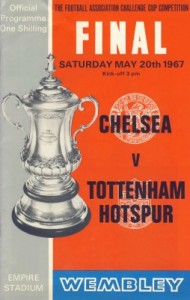 The second Semi-Final takes place on Sunday when North London meets South West London. Chelsea and Spurs have never met in the FA Cup at the Semi-Final stage, although did meet in the 1967 Final when Tottenham emerged winners 2-1. Chelsea have gone through a mini-resurgence under Roberto Di Mattaeo, progressing through to the Champions League Semi-Finals, although they looked a little leg weary in their Easter Monday draw at Fulham and were fortunate with decisions in their 2-1 win over Wigan. Spurs lost at home in their last Premier League outing to Norwich City and the North London club have only won two of their last ten fixtures. Has all the talk of Redknapp’s departure for the England job unsettled Tottenham? They have some talent in their squad, but it’s a bad time to hit a rocky patch as the business end of the season approaches.
The second Semi-Final takes place on Sunday when North London meets South West London. Chelsea and Spurs have never met in the FA Cup at the Semi-Final stage, although did meet in the 1967 Final when Tottenham emerged winners 2-1. Chelsea have gone through a mini-resurgence under Roberto Di Mattaeo, progressing through to the Champions League Semi-Finals, although they looked a little leg weary in their Easter Monday draw at Fulham and were fortunate with decisions in their 2-1 win over Wigan. Spurs lost at home in their last Premier League outing to Norwich City and the North London club have only won two of their last ten fixtures. Has all the talk of Redknapp’s departure for the England job unsettled Tottenham? They have some talent in their squad, but it’s a bad time to hit a rocky patch as the business end of the season approaches.
To the fans of all four teams, enjoy the game and the occasion, even though for two clubs their FA Cup dream will end this weekend. My kiss of death (I mean prediction) is for an all-Blue Final with Everton and Chelsea to come through and set-up a repeat of the 2009 Final. But with my lack of tipping skills, expect Liverpool and Spurs to take to the Wembley turf in May for the Final!
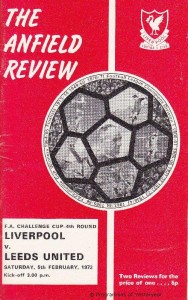 “On what grounds are you applying to read English at Liverpool of all places?” my mystified English teacher asked me. How could I tell him the grounds were Anfield and Goodison Park?
“On what grounds are you applying to read English at Liverpool of all places?” my mystified English teacher asked me. How could I tell him the grounds were Anfield and Goodison Park?